Key takeaways:
- Understanding and identifying triggers of pregnancy anxiety, such as health concerns and societal pressures, is crucial for gaining control over anxious feelings.
- Utilizing practical coping strategies like deep breathing, journaling, and seeking support from friends or therapists can significantly alleviate anxiety during pregnancy.
- Maintaining mental wellness through mindfulness, physical activity, and nutrition plays a vital role in managing anxiety and enhancing overall well-being during pregnancy.
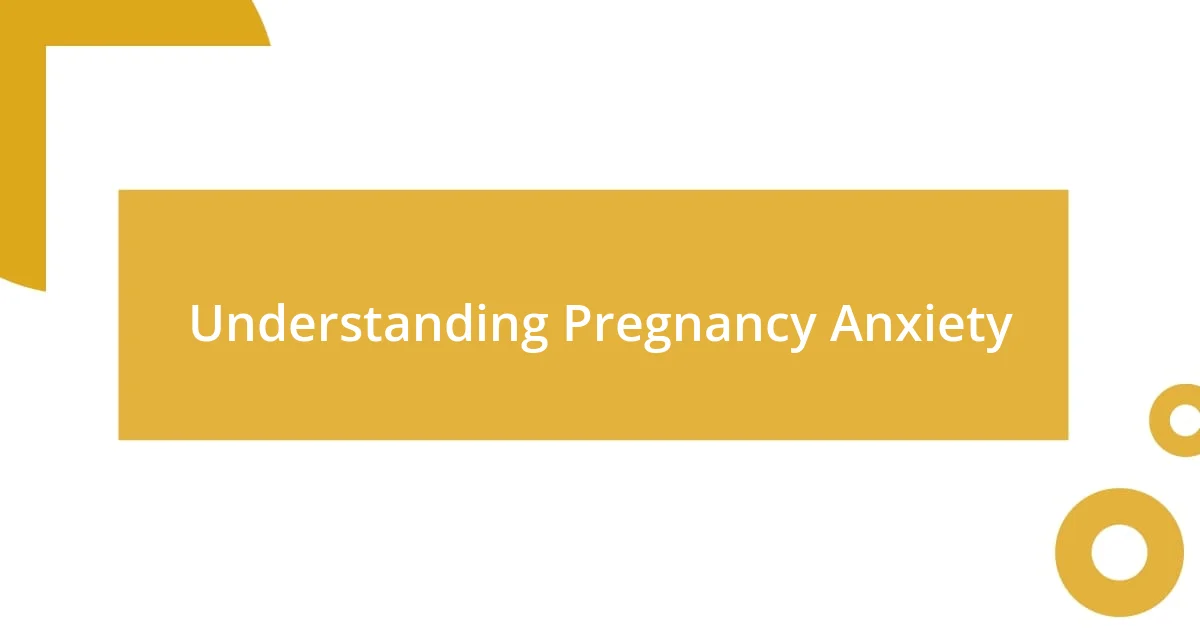
Understanding Pregnancy Anxiety
Pregnancy anxiety is more common than many realize. I remember feeling an overwhelming sense of dread as I approached my due date, filled with questions about whether I would be a good parent. It’s normal to feel anxious when facing such a monumental change in life; it’s a mix of excitement and fear that can lead to sleepless nights.
As I navigated through those anxious moments, I found it helpful to identify my triggers. Was it the countless online articles about potential complications that left me feeling stressed? Or was it the constant pressure to embody the “perfect mom”? Understanding my triggers helped me gain control over my anxiety, turning chaos into clarity.
Feeling anxious doesn’t make you weak; it makes you human. Each time a wave of worry hit me, I tried to remind myself that it was okay to feel this way. Have you ever felt like everyone around you was calm, while you were sweating the small stuff? Acknowledging those feelings brought a sense of relief, allowing me to reach out and share my worries with others instead of carrying them alone.
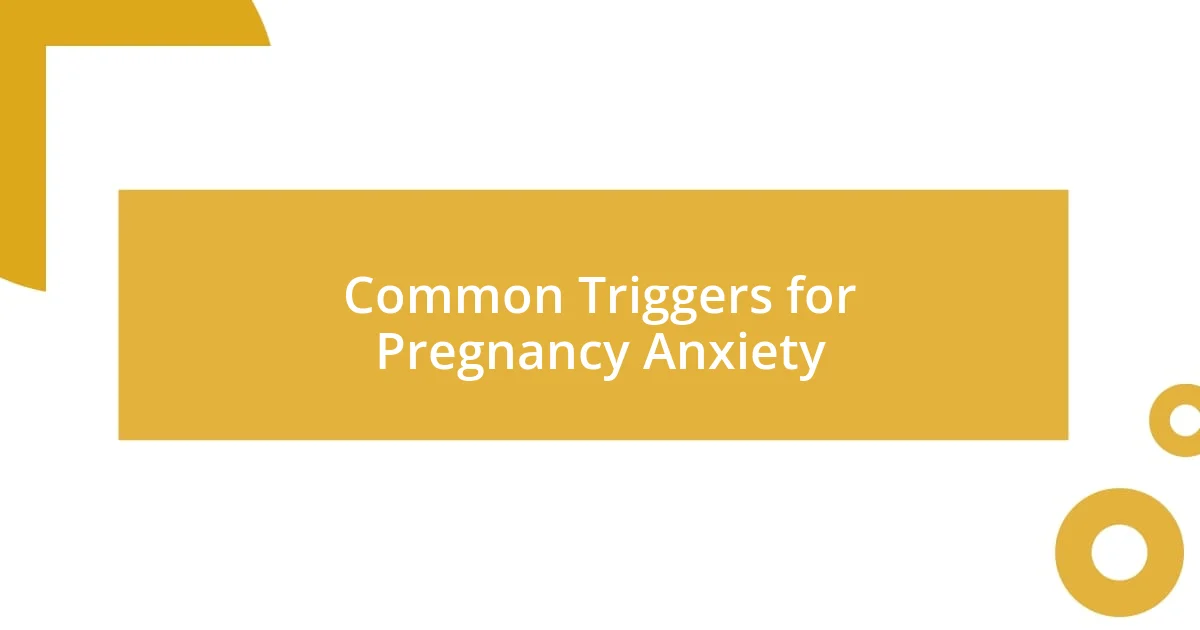
Common Triggers for Pregnancy Anxiety
During my pregnancy, I discovered how easily anxiety could creep in from various sources. One minute, I was planning the nursery, and the next, I was spiraling over what to name the baby. It’s fascinating how our minds can latch onto worries that seem trivial but can feel monumental at the moment.
Common triggers for pregnancy anxiety include:
- Health Concerns: Worrying about the baby’s development and potential complications can be overwhelming.
- Expectations from Others: Pressure to meet societal standards of motherhood can create unnecessary stress.
- Fear of Change: The impending transition to parenthood brings uncertainty about your life and relationships.
- Information Overload: Constantly consuming medical advice and horror stories online can amplify anxiety levels.
- Financial Worries: The financial burden of a new baby can be daunting and lead to sleepless nights.
Even something as mundane as a well-meaning conversation with a friend could trigger a spiral of self-doubt inside me. I remember a chat about their perfect birth story, which, instead of inspiring me, left me plagued with questions about my own upcoming experience. Recognizing these triggers helped me practice mindfulness, giving me the tools to respond rather than react to my anxious feelings.
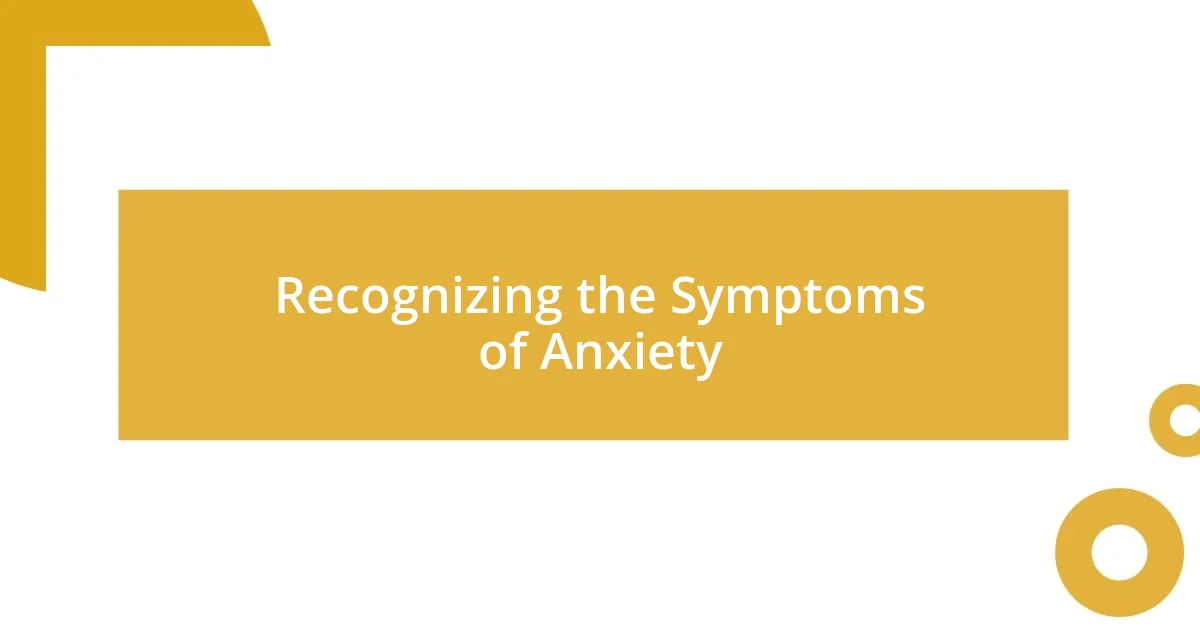
Recognizing the Symptoms of Anxiety
Recognizing anxiety symptoms can be a crucial step in managing pregnancy-related worries. I found myself often feeling a tightness in my chest or a racing heart when triggered by anxiety. These physical symptoms, combined with racing thoughts about pregnancy and parenting, signaled to me that I needed to take a step back. It’s fascinating how our bodies communicate with us, isn’t it? I learned to pay attention to these signs instead of dismissing them as random discomfort.
Beyond the physical sensations, there were emotional symptoms that I had to acknowledge. I would catch myself feeling irritable or easily overwhelmed, particularly when plans changed at the last minute. There were moments when I felt detached or distant from my loved ones, lost in a swirl of anxious thoughts. Looking back, it was those feelings of disconnection that made me realize I needed to take proactive steps to manage my anxiety better. Have you ever felt that disconnect, only to realize anxiety had snuck in uninvited?
Lastly, it’s important to recognize behavioral changes. I often found myself avoiding situations that made me feel anxious, such as baby showers or even casual gatherings with friends who had children. This avoidance gave me short-term relief but ultimately didn’t help me cope. Instead, I encouraged myself to lean into those uncomfortable situations gradually, reminding myself that it’s a part of the process. By facing these triggers head-on, I could transform anxiety into moments of growth.
| Physical Symptoms | Emotional Symptoms |
|---|---|
| Tightness in chest | Irritability |
| Racing heart | Feeling overwhelmed |
| Fatigue | Detachment from loved ones |
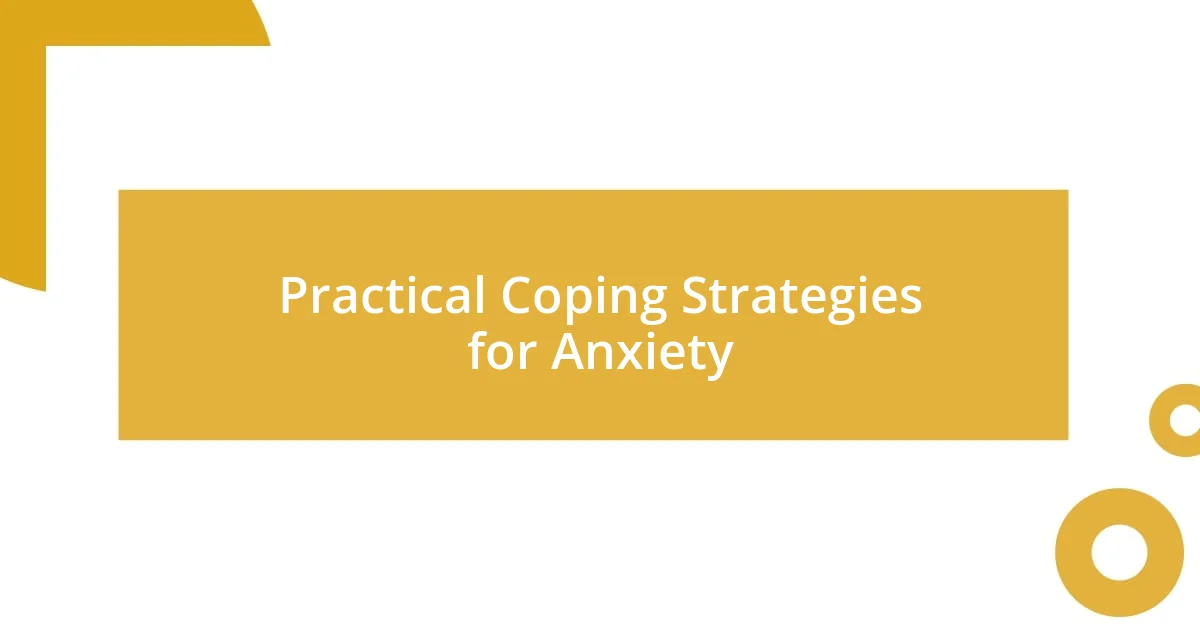
Practical Coping Strategies for Anxiety
When it comes to coping with pregnancy anxiety, I found that developing a grounded routine was immensely beneficial. Each morning, I’d carve out a few minutes for deep breathing exercises, which helped ground me in the present moment. Sometimes, I’d close my eyes and visualize my breath flowing in and out, picturing my worries slowly dissipating. Have you ever tried simply inhaling deeply when anxiety strikes? It’s remarkable how a few breaths can create a tiny oasis of calm in a whirlwind of thoughts.
Journaling also became a safe haven for my thoughts. In those pages, I spilled everything—from my worries about labor to the most mundane daily stresses. Reflecting on my entries later, I often found patterns in my anxiety triggers. It was almost like having a dialogue with myself, where I could process emotions that felt too heavy to carry alone. If you’ve ever put pen to paper, you know how liberating it can be to release those bottled-up feelings.
Lastly, reaching out for support was a game-changer. I made a point to connect regularly with friends who were either new moms or pregnant themselves. Sharing our experiences while sipping tea felt like sitting in a circle of safety, where we understood each others’ struggles without judgment. It was comforting to know I wasn’t navigating these feelings solo. Have you ever felt the weight lift after just talking things through with someone? Sometimes, those conversations can shine a light on worries that seem much bigger in isolation.
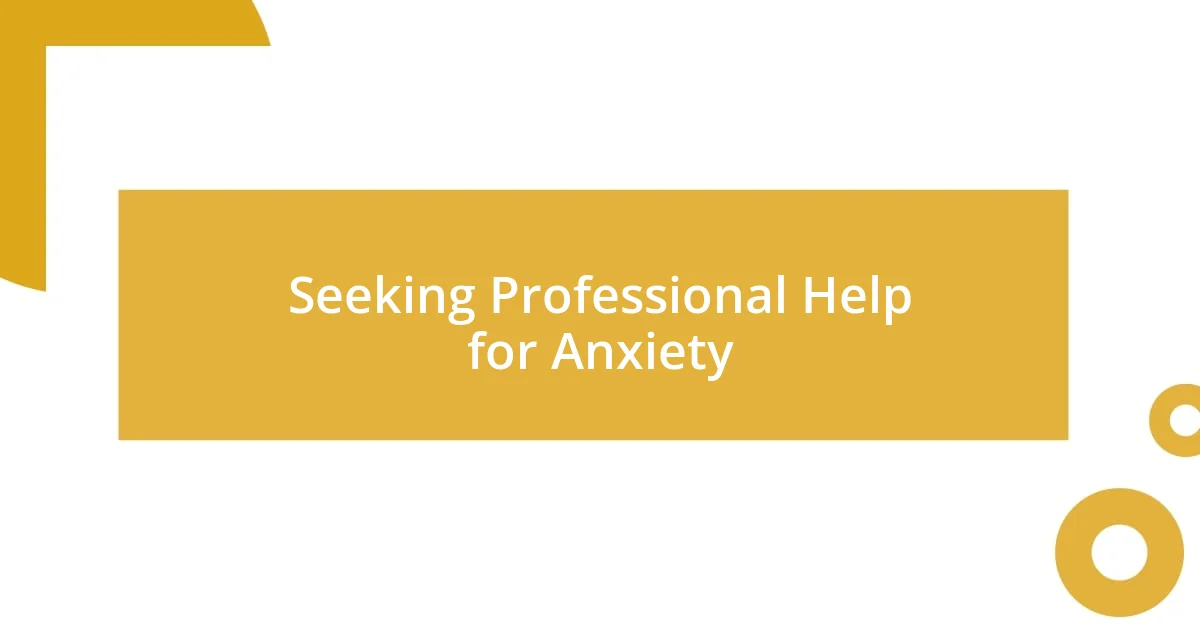
Seeking Professional Help for Anxiety
Seeking professional help for anxiety can feel daunting, but I’ve realized it’s one of the best choices a person can make. I remember the first time I walked into a therapist’s office, my heart raced like I was about to face a monster. What I found, however, was a safe space where I could unravel my feelings without fear of judgment. Have you ever felt that overwhelming need to just talk to someone who gets it? It’s a relief and a crucial step toward managing anxiety.
Therapy introduced me to valuable coping strategies, such as cognitive-behavioral techniques. I learned to challenge my anxious thoughts, instead of letting them spiral out of control. For example, when I feared something terrible would happen during labor, my therapist encouraged me to ask myself, “What’s the evidence for this thought?” This practice helped me gain a different perspective. I realized many of my fears were unfounded. Have you found yourself caught in a loop of anxious thinking? Sometimes, simply questioning those thoughts can shed light on more rational and calm alternatives.
Additionally, I found immense value in support groups led by mental health professionals. Being surrounded by others who were experiencing similar challenges fostered a sense of camaraderie that eased my anxiety. Listening to their stories reminded me that I was not alone, and it felt comforting to know others shared my struggles. Have you ever met someone who just understood? It’s incredible how powerful those connections can be in making anxiety feel less isolating.
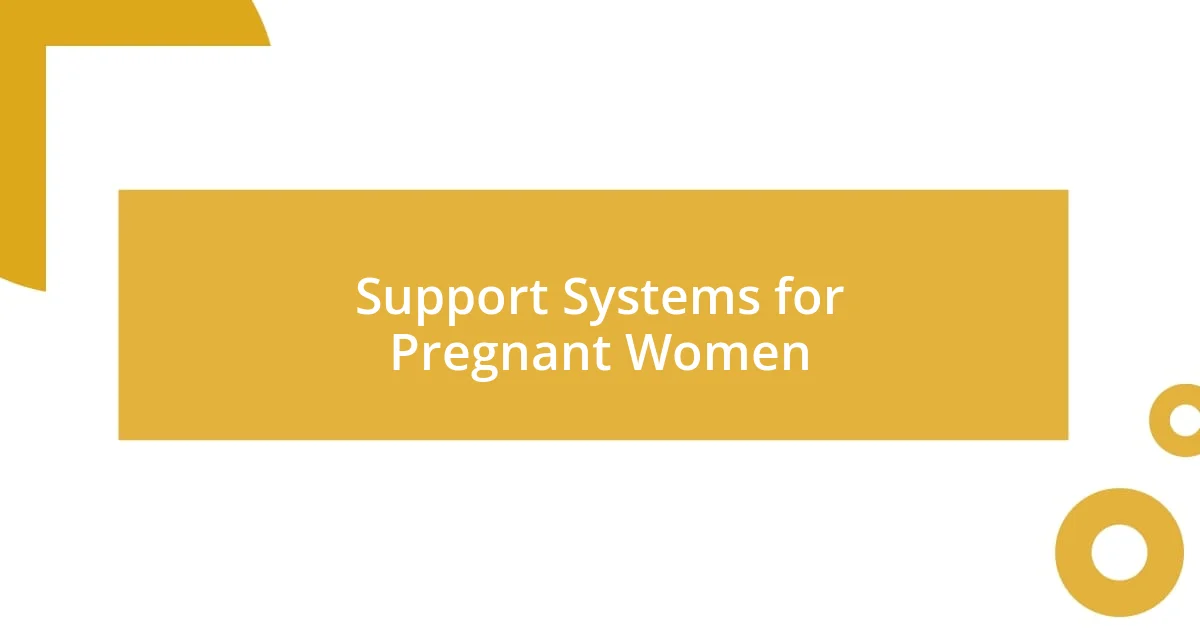
Support Systems for Pregnant Women
Support systems can play a crucial role in easing the anxiety that often accompanies pregnancy. I remember one of the most impactful moments for me was when my partner stepped in to listen. Just having someone validate my feelings made all the difference. Have you ever experienced that relief when someone simply acknowledges your worries? It’s such a simple act, yet it can be profoundly comforting.
Family and friends also provide an invaluable support network. I frequently turned to my sister, who had navigated pregnancy just a year before me. We would chat for hours about everything, from the silly fears to the more serious ones. Those conversations felt like a release valve for my anxiety. I find it fascinating how sharing experiences creates bonds. Have you noticed how talking about shared experiences can bring people closer together?
Another source of support I discovered was online communities. I was amazed at how many expectant moms were seeking connection and understanding, just like me. Joining a few forums and groups gave me a sense of community, where I could share my feelings and also learn from others’ experiences. Engaging in dialogues with women who truly got it made me feel less isolated. Have you ever felt that connection from someone else’s story? It’s amazing how the shared journey can lighten the emotional load of pregnancy.
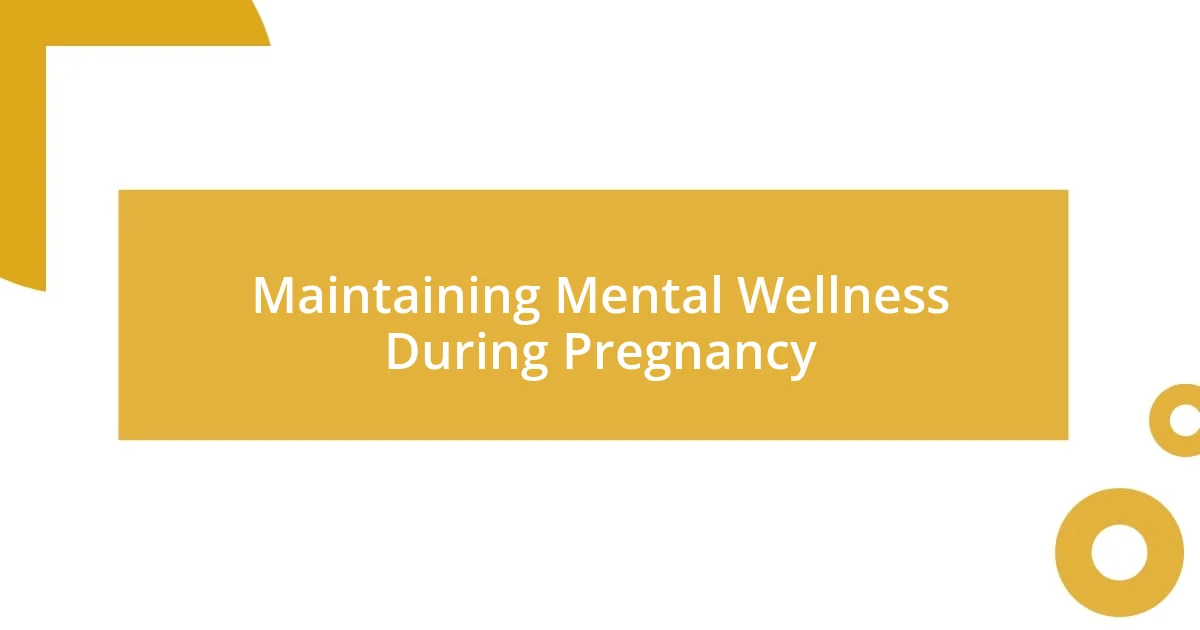
Maintaining Mental Wellness During Pregnancy
Taking care of my mental wellness while pregnant became a priority for me. I vividly remember the moments when I practiced mindfulness meditation during stressful times. It allowed me to center myself and relieved that heavy feeling in my chest. Have you ever noticed how just a few minutes of focused breathing can transform anxiety into calm? It’s incredible how such a simple practice can have profound effects.
Physical activity also played a key role in maintaining my mental well-being. I started incorporating gentle exercises like prenatal yoga into my routine. The act of moving my body, paired with deep breaths, felt invigorating and rejuvenating. I often found myself smiling during the sessions, reveling in the connection with my growing baby. Have you ever experienced that joyful burst of energy from simply stretching your body? It’s refreshing and empowering, especially during times of uncertainty.
Lastly, I paid attention to my nutrition, knowing it directly impacts mood and anxiety levels. I shifted my focus to whole foods, and I made a deliberate effort to incorporate more fruits, vegetables, and omega-3-rich foods into my meals. The day I whipped up a colorful salad packed with fresh ingredients, I felt a surge of positivity. Have you ever felt the uplifting vibes from a nutritious meal? It’s astonishing how nourishing our bodies can reflect positively on our minds, easing the anxieties that come with pregnancy.














